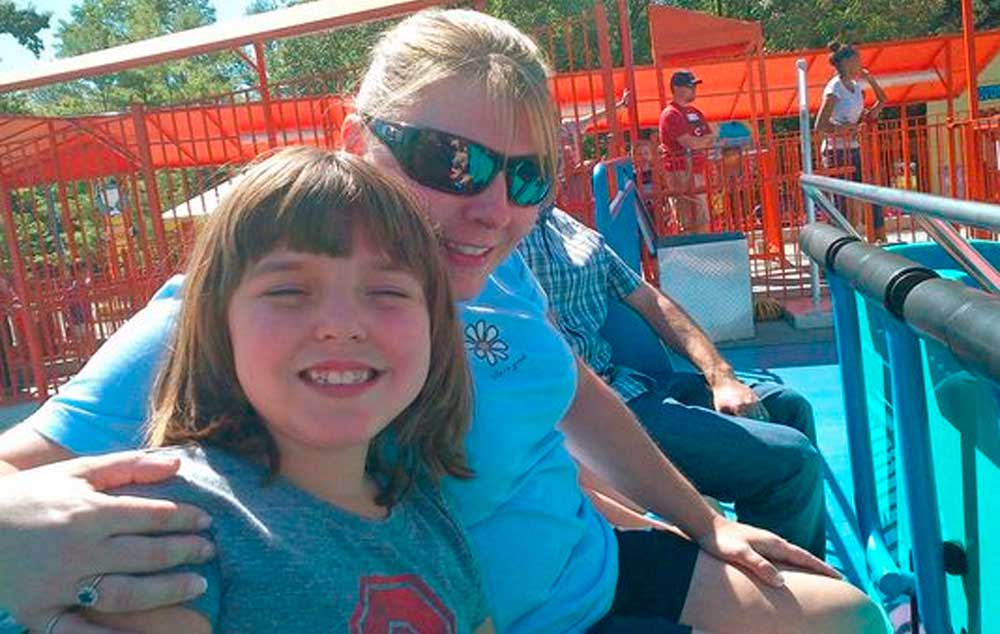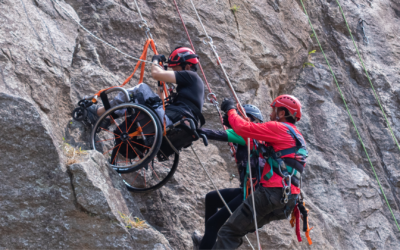
Disabled guests now have to request a boarding time for rides, but autistic kids can go ballistic while they wait.
KINGS MILLS, Ohio — Parents are taking to Facebook and online support groups to express frustration with what they say is a policy change at some amusement parks that doesn’t accommodate autistic children’s special needs.
In recent years, Kings Island north of Cincinnati permitted riders with disabilities to enter a ride area with a companion through an alternate entrance and ride after just a brief wait, parents say.
STORY: Texas park caters to special needs
STORY: First theme park for disabled opens
That changed this summer when the park began requiring disabled riders to request a boarding time — equal to a ride’s anticipated wait time for all guests in line — and return at the designated time.
“I’m not asking for free admission to the park or everybody stop the world for him to get on,” said Marcy Mullins, a Harrison, Ohio, mom of an 11-year-old autistic boy. “I would like to just see him happy, and if he can ride a ride a few times, it would mean the world to me.”
The policy change presents problems for children with autism, who thrive on routine and order and have difficulty waiting in or out of line, parents say.
Officials from Kings Island’s parent company, Cedar Fair Entertainment (FUN) in Sandusky, Ohio, say the boarding pass policy always has been in effect but may have been enforced inconsistently at the dozen amusement parks it owns across the USA and in Canada.
The change this year is that all Cedar Fair parks — including Knott’s Berry Farm in suburban Los Angeles, Cedar Point between Cleveland and Toledo and Kings Dominion north of Richmond, Va. — must abide by the policy, spokeswoman Stacy Frole said. Disabled guests can eat or go on other rides with shorter wait times before returning to the original ride. Only one boarding pass is issued at a time.
Bill Shepherd of Mason, Ohio, makes up to 15 excursions to Kings Island each summer with his 20-year-old autistic son, Gage, who struggles with crippling anxiety and impulse and aggression issues. Shepherd said the boarding pass policy doesn’t work for people with autism spectrum disorders.
“Once Gage discovered he couldn’t get on, he was biting his hand, angry and lashing out,” Bill Shepherd said. “He mostly hurts himself, but he scares everyone around him.”
Many amusement park chains have policies creating alternate queues for people with disabilities, often meaning those using wheelchairs, according to Robert Niles, editor of ThemeParkInsider.com. However, in practice, a park patron with disabilities may have a different experience.
“Operations personnel don’t like having anyone standing or sitting around a very busy load or unload area, so they’ll move wheelchair parties onto and through an attraction as quickly as they can,” Niles said in e-mail. “Often, it’s just easier logistically to let someone on a ride right away than to make them wait or mess around with passes and such.”
But amusement park companies want visitors with disabilities to experience the park as closely as possible as a guest without disabilities, he said.
“That means waiting for certain popular attractions even if it’s not in a traditional queue,” he said. As the years go by, amusement parks are “establishing and refining procedures that result in wheelchair parties actually waiting closer to what they would have waited without a wheelchair,” Niles said.
Chad Yuskewich of Blue Ash, Ohio, said his family spent nearly $300 on season passes to Kings Island only to find them virtually unusable because of the changes. He said he found out about the policy during the family’s first visit to the park this year.
“When I told her, ‘No, we’re not getting on right now; we have to wait,’ we had a meltdown,” said Yuskewich about his 10-year-old autistic daughter, Kendall, who began kicking, screaming and pushing.
TRAVEL TIPS: How to visit Walt Disney World with special-needs kids
Six Flags Entertainment (SIX) — which has 14 parks in seven states, Canada and Mexico — uses two types of special-access passes for its disabled guests. One pass ensures immediate boarding while the other allows guests to make reservations based on wait times for boarding.
“Alternate access is intended to accommodate guests with mobility aides and service animals and not to bypass others waiting in line,” the company’s guidelines say.
Guests with an autism spectrum disorder at Six Flags receive the immediate boarding special-access pass, spokeswoman Sandra Daniels said.
Disabled guests at Walt Disney (DIS) amusement parks — the company operates parks in six locations around the world — also can receive special accommodation cards for ride access. Some disabled guests at those parks can use their cards for front-of-the-line access without wait times.
It was not immediately clear whether guests with an autism spectrum disorder at Walt Disney amusement parks are included in policies for disabled guests, and officials at the companies would not comment beyond the written policies.
Frole said Cedar Fair worked with the Autism Society, a Bethesda, Md.-based advocacy organization, to develop information for parents in planning visits to Cedar Fair parks. Those tips are published online on each park’s website.
“We review our policies on a regular basis. And when we see inconsistencies, we implement best-practices policies,” she said. “We do our best to accommodate our guests, and that’s why we have this equal access policy in place.”
Jennifer Repella, vice president of programs with the Autism Society, said her group supports the boarding pass policy but had no role in its implementation.
“There’s no question that many people with autism can’t wait in line, but there’s no question that a kid with ADHD or a person with a back problem can’t wait in line,” she said of children with attention deficit hyperactivity disorder. “Where do you draw the line? We don’t want preferential treatment. We want equal access.”
All Autism Society chapters don’t agree with that endorsement. Patty Proctor, executive director of the Autism Society of Greater Cincinnati, said her chapter has received dozens of complaints from parents since Kings Island opened April 27. The group said on its Facebook page that it is continuing discussion with the park on handling the needs of all disabled guests, including those with autism.
A North Carolina woman launched an online petition on change.org this summer appealing the policy at Carowinds, a Cedar Fair park in Charlotte, N.C. She accused the amusement park operator of making its parks “inaccessible to children with autism.”
A California mother posted a video on YouTube in March of her autistic son’s reaction to being told he had to wait 1½ hours for a ride at Knott’s Berry Farm, another Cedar Fair-owned property. The family had to leave the park after she was unable to calm the boy.
About 1 in 88 American children has some form of autism spectrum disorder, a 78% increase compared to a decade ago, according to the federal Centers for Disease Control and Prevention.
The brains of people with autism spectrum disorder are not wired to filter sensory stimuli, said Dr. Stephen Strakowski, chairman of the department of psychiatry at University of Cincinnati Health. Seemingly simple ordeals such as waiting in a line can leave autistic children, especially those unable to communicate or verbalize their emotions, feeling anxious, uncomfortable and prone to acting out.
Cedar Fair’s boarding pass policy doesn’t appear to take into consideration the needs of children with autism, he said.
“Aimless waiting around the park is not any different than waiting in line,” Strakowski said. “Kudos to these parents for helping their kids have normal life experiences as other children and shame on this company for not helping them do that.”
Frole said guests who have experienced issues at Cedar Fair parks should contact each park directly.
Mullins said she and at least 15 other Cincinnati-area parents tried appealing the policy to both Kings Island and Cedar Fair, but phone messages weren’t returned and they received only form letter email responses.
Bill Shepherd said Kings Island’s roller coasters provided more than a momentary thrill for son Gage. Visits to the park eased his anxiety and offered a respite from the day-to-day challenges of living with autism.
“I don’t think they really understand autism or the implications of what their change does to kids with autism,” he said. “This has taken away one of those really good outings that’s helped him.”
[youtube=http://www.youtube.com/watch?feature=player_embedded&v=0H0Txn9Q4JA]
Source: USA TODAY
Compartilhe
Use os ícones flutuantes na borda lateral esquerda desta página
Siga-nos!
Envolva-se em nosso conteúdo, seus comentários são bem-vindos!
Artigos relacionados
Teleton AACD. A pessoa com deficiência como protagonista.
Teleton AACD. A pessoa com deficiência como protagonista. Uma iniciativa internacional abraçada pelo SBT no Brasil.
Acessibilidade no ESG. Equipotel aborda o tema para o turismo.
Acessibilidade no ESG, para o mercado do turismo. Equipotel aborda a importância da inclusão da pessoa com deficiência.
Morte Sobre Rodas. Filme inclusivo foi candidato ao Oscar.
Morte Sobre Rodas. Dois protagonistas do filme, são pessoas com deficiência, um usuário de cadeira de rodas e outro com paralisia cerebral.






0 comentários